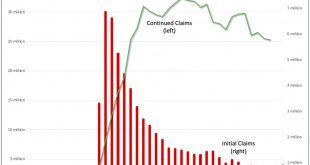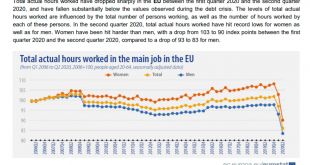TRADE WARS AFTER CORONAVIRUS Economic, political and theoretical implications An online conference from the WEA, 19th October to 5th December, 2020 The current correlation of forces in the struggle for global economic hegemony Juan Vázquez Rojo The objective of this paper is to analyze the current correlation of forces between China and the United States to verify whether this distribution of power corresponds to the current hegemonic order. Starting from the concept of interstate...
Read More »Humanism or racism
from Hardy Hanappi and issue 93 of RWER The state of the global political economy is producing an extremely dangerous dynamic. The human species has conquered the planet, its productive forces are reaching ever more sophisticated levels and are arranged in a global network that would be able to transform growth of profits into growth of general welfare. But such a transformation needs a political agent, which is powerful enough to defeat the forces, which currently exploit large parts of...
Read More »Waiting for a vaccine and the collaborative research alternative
from Dean Baker It seems increasingly likely that China will begin providing vaccines to its own people, as well as those in some other countries, by December, and possibly as early as next month. The prospect of a vaccine being available that soon has to look good to people here, now that the Trump administration’s pandemic control efforts have completely failed. The whole country would like to get back to normal, but that doesn’t seem like a serious possibility until we have an...
Read More »Truth and science
from Lars Syll In my view, scientific theories are not to be considered ‘true’ or ‘false.’ In constructing such a theory, we are not trying to get at the truth, or even to approximate to it: rather, we are trying to organize our thoughts and observations in a useful manner. Robert Aumann What a handy view of science. How reassuring for all of you who have always thought that believing in the tooth fairy make you understand what happens to kids’ teeth. Now a ‘Nobel prize’ winning...
Read More »Pandemic Depression
from David Ruccio U.S. billionaires have recouped all of their wealth—and more—during the Pandemic Depression. Meanwhile, since May, the number of poor Americans has grown by about 8 million. And the number of American workers applying for and receiving unemployment benefits continues at record levels. According to Forbes, Pandemic be damned: America’s 400 richest are worth a record $3.2 trillion, up $240 billion from a year ago, aided by a stock market that has defied the virus. When...
Read More »Hours worked, EU and UK Covid-19 edition.
Source Measuring the labor market and understanding labormarket data has recently been more of a challenge than usual. An large number of people seem to leave the official labor market, rendering unemployment data less useful. Also, a large number of new arrangements influence who are counted as unemployed or as workers. The best and at this point of time the most useful data we have might be data on total hours worked. Which, for the EU and the UK, show a pitiful sight. It resembles...
Read More »Studying economics — a total waste of time
from Lars Syll One may perhaps, distinguish between obscure writers and obscurantist writers. The former aim at truth, but do not respect the norms for arriving at truth, such as focusing on causality, acting as the Devil’s Advocate, and generating falsifiable hypotheses. The latter do not aim at truth, and often scorn the very idea that there is such a thing as the truth … These writings have in common a somewhat uncanny combination of mathematical sophistication on the one hand and...
Read More »The Theil inequality index: a flexible tool for the modern political economist
Contrary to the Gini-index, the Theil inequality index enables us to directly tie estimates of inequality to the class and ownership structure of a society. As such, it’s an indispensable tool for the political economist, requiring a-priori knowledge of political economic theory but also an inductive reading of the sources and the situation. So, why is the Gini and not the Theil index often the economists inequality metric of choice? The Gini-index is an often used metric to...
Read More »Economics education needs a revolution
from Lars Syll You ask me what all idiosyncrasy is in philosophers? … For instance their lack of the historical sense, their hatred even of the idea of Becoming, their Egyptianism. They imagine that they do honour to a thing by divorcing it from history sub specie æterni—when they make a mummy of it. Friedrich Nietzsche Nowadays there is almost no place whatsoever in economics education for courses in the history of economic thought and economic methodology. This is deeply worrying....
Read More »Limits of mainstream economics today
from David Ruccio Keynes’s criticisms of neoclassical economics set off a wide-ranging debate that came to define the terms of—and, ultimately, the limits of debate within—mainstream economics. On one side are neoclassical economists, who celebrate the invisible hand and argue that markets are the best way to efficiently allocate scarce resources. On the other side are Keynesian economists, who argue instead for the visible hand of government intervention to move markets toward full...
Read More » Real-World Economics Review
Real-World Economics Review






